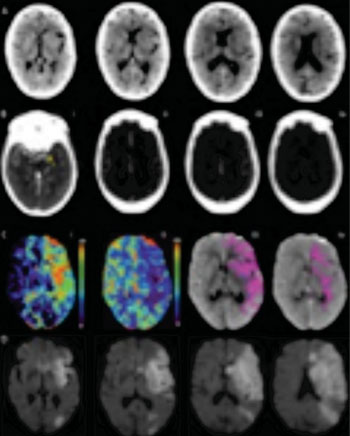Faster and Simpler Treatment for Stroke Patients Using Multiphase CT
By MedImaging International staff writers
Posted on 27 Sep 2015
The results of a new study show that multiphase Computed Tomography (CT) angiography brain-imaging could enable clinicians to treat Acute Ischemic Stroke (AIS) patients faster, and better, potentially saving lives.Posted on 27 Sep 2015
The new technique can provide critical data on collaterals, improve clinical decision making, and help clinicians predict clinical outcomes better than using current imaging techniques. The study was published online in the May, 2015, issue of the journal Radiology.

Image: Multimodal CT images obtained 2 hours 18 minutes after symptom onset in an 87-year-old woman with an NIH Stroke Scale of 15 and left hemisphere symptoms (Photo courtesy of Radiology 2015:257;2;510-520, and RSNA 2015).
The study included 147 AIS patients. All of the patients underwent scans using regular CT imaging, single-phase CT angiography, perfusion CT, and the new multiphase angiography CT technique. The various techniques were compared for their reliability, and ability to predict clinical outcomes. The patients had a mean age of 72 years. Approximately 50% of the patients were male.
Muliphase CT images the whole brain, does not require post-processing, and is less expensive than for example Magnetic Resonance Imaging (MRI), and CT perfusion. In addition the new technique requires minimal radiation, and does away with the need for additional contrast media.
The results of the study showed that multiphase CT could substantially impact the care of stroke patients, although larger studies are still needed.
Michael Lev, MD, director of emergency radiology, and emergency neuroradiology, Massachusetts General Hospital (Boston, MA, USA), said, “With just a single phase, the physician may over- or underestimate the core infarction. Multiphase CT angiography is a way to more accurately detect that element. The key advantage is that the three sets of images provide a much better assessment of the collaterals.”
Related Links:
Radiological Society of North America (RSNA)
Massachusetts General Hospital














